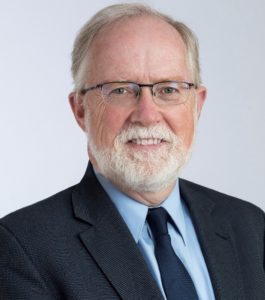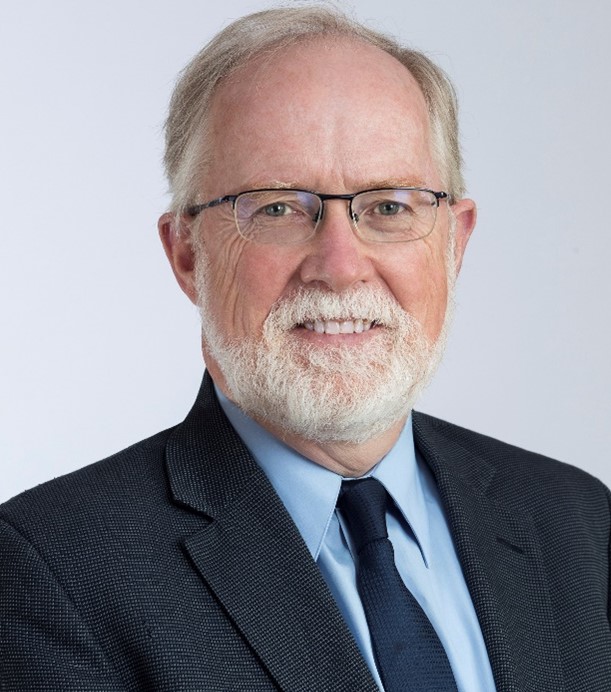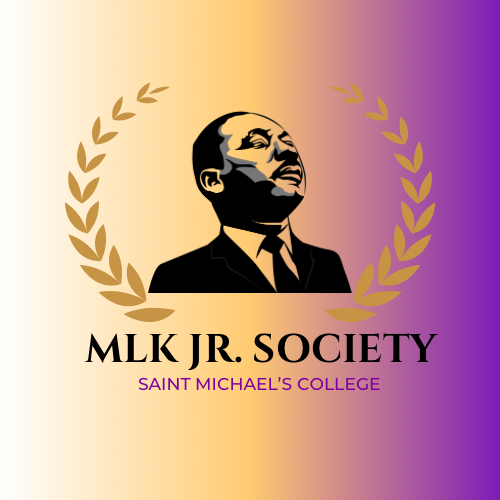
Michael Naughton, PhD
Considering the time and money Americans spend on higher education, they had best not deprive themselves of a good answer to the question of why they go to school, a leading scholar and author on Catholic higher education said Wednesday evening at Saint Michael’s College.
“Are you living in a way at this place that is worthy of the purpose that you want to have?” asked Michael Naughton, director of the Center of Catholic Studies at St. Thomas University in Minnesota and an author whose lecture topic was “Why am I at this School? The Purpose of Catholic Higher Education.” He spoke in McCarthy Arts Center Recital Hall at 7 p.m. to an intimate live audience, with a larger remote audience watching online. Sponsoring the talk was the Edmundite Center for Faith and Culture, and the Center’s director, Fr. David Theroux, S.S.E., ’70 made the introductions.
Naughton opened by urging students to think back on the reason they came to college, be that a job or career aspiration, a hope to make the world a better place, or even wanting to party on their parents’ dime or having no place else to go. A problem with many Americans, he said, is, “we speak highly individualistically, but not institutionally,” thereby lacking common agreement within institutions on what is important most of the time.
He spoke of three fundamental versions of universities: First is the Catholic view, which he said is the oldest, drawing on a 2500-year history starting in Ancient Greek and Rome, then interacting with Christ the “logos” (Word) to influence how Catholics understand education with the earliest universities in Bologna, Italy and France starting in the 11th century. That is where we get the notion of liberal arts, which comes from “that which frees you,” and “not liberal in a political sense,” he said. This view of education chiefly is interested in advancing the “art of the word and the art of the number,” leading to “colleges of arts and sciences” in universities today.
The next version of higher education, he explained, is the modern research university that comes about in the early 19th century and has built steam since, committed to the idea that knowledge is to be of practical use and all about career preparation, research and development. The third view is the post-modern view, or what the speaker called the “critical theory view” that would have the “university as activist,” taking its lineage from Marx, who said the point of philosophy or education was not to understand the world but to change it.
He looked back on history for some of his answers on finding purpose for education. He sees a twofold function for education: Primary is passing along the best of the culture. Everyone in the room sees the world in a particular way on matters such as life and death, nature and creation, love, family, race, marriage, politics, and, “most important, how do you see God?” which the speaker said is at the heart of any culture, whether religious or secular.
Naughton said he taught business for decades, where the culture that is passed on is “financial and commodified,” fixated on profit too often, in his view, to the exclusion of other important cultural values, though he greatly loves teaching business.
The notion of what is “best” in a culture “is where we have our culture wars,” Naughton said. He gave the example of his son who was classically educated reading great literature as an undergraduate, and once in a larger university found the prevalent readings there, emanating from modern culture, to be “boring and predictable” by comparison. “Dostoevsky is not predictable – he’s talking about the nature of the human condition,” Naughton said.
But education is not only about passing on the best of culture – it also is about drawing out the best from students, he said, expanding with the idea that the best educators are not just experts and teachers, but witnesses to what they believe. He said he is not anti-tech, but the necessary switch to remote learning in the recent pandemic “moved to the transactional” at the expense of this personal witness that he sees as being so vital to education.
The speaker spent considerable time telling the interesting history of Western education from the first university in Bologna, Italy, to Paris to Oxford to Cambridge and beyond. From that, he distilled two central principles to focus a question of purpose upon: What he called the “university principle,” and the “collegiate principle.” The first “cultivates the mind to make it more precise, active, penetrating,” while the collegiate cultivates the nexus of relationships, where knowledge is property digested in community. “What the university puts into the mind, the college will drive into the heart,” he said, adding later that Saint Michael’s residential requirement for all students promotes this key aspect of education well.
The speaker said this collegiate aspect of education could counter with vitality the fact in his view that in the U.S. people “talk mainly about rights and eventually you get license,” yet, “rights need duties … justice is important but it better have mercy with it…. We talk about work a lot but we’re also made to rest.”
Reflecting on these categories of university and collegiate brought him back to his opening question about why a student is at a school. For him, a key test is to see how one flourishes in a university – what quality of friends do you make, are they for a lifetime, and are you sad when you leave?
He said a university has to have specialization but also help students see each discipline in the light of other disciplines, which takes great attention, and today’s generation might be the most distracted ever in his view. He suggested students take a “golden hour” each day to turn off all technology and give themselves to a topic for focused study, undistracted.
He supports a complementary embrace of faith and reason at a university, though that is most controversial, he acknowledged. To Naughton, the heart of Christian faith is in the incarnation, Christ, the living word or logos, which also means reason in translation; so, the start of John’s Gospel almost might be translated as saying “In the beginning was reason and the reason was with God and the reason was God.” To him, all creation has imprinted patterns that can be understood, which Einstein saw as incomprehensible and wonderful, almost magical. Each discipline with “ology” in its name is talking about the “logos” of that topic in its very name, he said.
“At a university we get caught up in specialization and we fragment the knowledge, and therefore the student,” he said. “We form them in the fragmentation.”
Asking a student “Where do you live?” gets at helping them express integrity, not only knowledge, since the experience of where one lives has such impact on a college experience. “The habits you’re learning at college are the habits you bring into marriage and families,” he said.
Naughton said pragmatism is good but it tends to kill wonder and depth of inquiry. He boiled down his insights to some closing notions: the importance of “vision” which to him means wonder and inquiry, and of friendships that go beyond just pleasure and utility, alongside professional preparation, which is also important of course.
Christian education in the speaker’s view amounts to being introduced to a new life — “an initiation into mystery,” he said, adding, “Lots of people are walking around with small worlds and vision – we want large ones.”

For all press inquiries contact Elizabeth Murray, Associate Director of Communications at Saint Michael's College.






